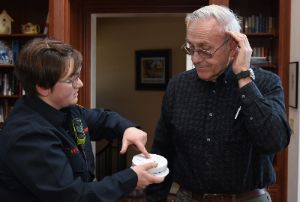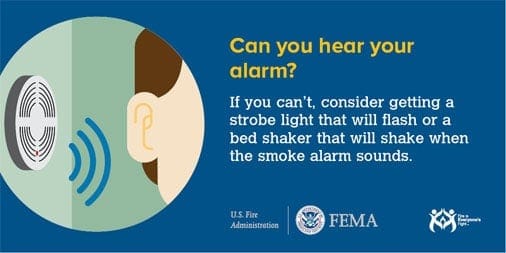Having a smoke detector in place is a simple, hugely effective strategy to prevent yourself from harm: Your risk of dying in a fire in your home falls by 55 percent when there’s a working smoke alarm present, per the National Fire Protection Association (NFPA).

to hear standard smoke detector alarms.
(Photo courtesy FEMA)
And for many people, the attention-grabbing blare of a fire alarm is all you need. If you have impaired hearing, though, the din of these life-saving devices may not be an effective alert to the presence of smoke, fire or carbon monoxide.
Alarms with flashing lights, as well as special vibrating alarms designed to wake someone who’s sleeping, are available for people who are deaf or have a hearing impairment.
Here’s what you need to know to ensure you have an alarm that provides you with the alert you need.
Why it matters
“Today more than ever, it’s important for residents to have the earliest possible notification of an emergency,” says Sharon Cooksey, a fire safety educator at Kidde, an alarm manufacturer.
That’s because escape time is lower now than previously needed—just two to three minutes—due to more fast-burning synthetic materials in homes, she says.
“This makes a quick evacuation a top priority,” Cooksey notes.
People at the highest risk of being harmed or dying in a fire include children, people who are under the influence of drugs/alcohol, and people with hearing loss, statistics show.
Choose a smoke alarm that’s suitable for your hearing loss
If you have high-frequency sensorineural hearing loss due to either age or noise exposure, an ordinary alarm may not give you the alert you need, says audiologist Rich Panelli of Nevada ENT.
“The risk of a normal alarm is that some produce only a high-frequency sound, and some do not produce an alarm loud enough for [people with] a severe to profound hearing loss to pick up,” Panelli says.
This is particularly significant at night, when people are likely to remove their hearing aids.
“NFPA advises that older adults or other people who are hard of hearing (those with mild to severe hearing loss) can use a device that emits a mixed, low-pitched sound,” Cooksey says.
Smoke alarms when you’re hard of hearing: Options
There are a few different options available, including:
- Strobe lights: Instead of relying simply on sound, the flash from strobe alarms gives a visual cue about dangers. If you’re counting on a strobe alarm for nighttime, when you might be asleep, look for one that has an intensity high enough to wake someone up, advises the NFPA. And be aware that older adults may be less responsive to strobe alarms, Cooksey points out.
- Vibration: Sleeping is a particularly high-risk time when it comes to fires. Fires during sleeping hours, between 11 p.m. and 7 a.m. account for 47 percent of fatal fires in residences, according to FEMA. Alarms that make the pillow or bed vibrate (often referred to as “bed shakers”) help wake people up.
- Interconnected alarms: “Alarms that cater to someone with severe to profound hearing loss include a combination of alerting devices, usually in one system,” Panelli says. With this system, when one alarm goes off, all of them do—the bed shakes, lights flash, sounds blare, and so on.

Whichever alarm system you select, make sure everyone in the house knows what signal (whether it’s light, sound, vibration, or a combo) to expect, Cooksey recommends.
What to look for in alarms for people with hearing loss
It can be helpful to connect with your hearing specialist to ask what type of alarm they believe is best-suited for your particular type of hearing loss. “When considering alerting systems, it is important to remember every patient is unique,” Panelli says.
Here’s what else to keep in mind when it comes to fire alarms:
- You need more than one. If you have several floors, you’ll need an alarm in each level (except for the attic), Cooksey says. Make sure to have one in every bedroom, she says.
- You’ll need to test them regularly. That way, you’ll know the alarm is working. Cooksey recommends a weekly test.
- Make sure the alarm is reputable. “Always look for alarms that have the label of a recognized testing laboratory, such as UL,” Cooksey recommends. You’ll find alarms that meet the UL standards for people who are deaf or hard of hearing from BRK Electronics, Gentex Corporation, Kidde Fire Safety, and Menards, Inc., notes the NFPA.
Note: This guidance is for households. People who own businesses like hotels must follow ADA laws.
CO detectors for people with hearing loss
Carbon monoxide, or CO, is a colorless, odorless gas produced from fossil-burning fuels used in furnaces, boilers, water heaters and fireplaces. Depending upon where you live, state or city laws may require you to have a working CO detector installed in your home. Even if they don’t, it’s a good idea to have one. Experts recommend installing a CO detector at least 15 feet from the entrance of each bedroom as well as one on every level of your home.
Much like smoke alarms for individuals with hearing loss, carbon monoxide detectors are available with strobe lights and vibrating devices. NFPA codes also apply to these devices, which means these appliances must emit a loud, low-frequency signal.
For more information, see the NFPA’s page on fire safety and hearing loss.
